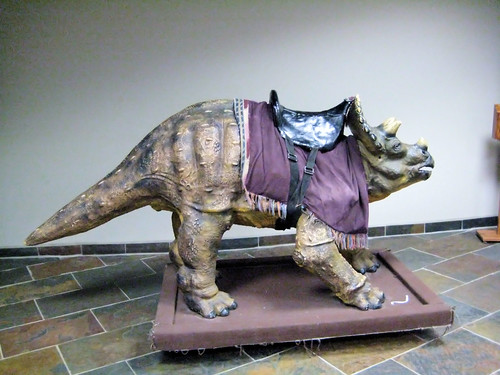A BUZZFLASH NEWS ANALYSIS
by Meg White
After a week of BuzzFlash analysis of Government Motors, Obama in the Middle East, North Korea's capture of American journalists, rape and murder in the Congo, the 20th anniversary of the Tiananmen Square massacre and much more, I thought I'd take the opportunity to bring you the lighter side of the dark  side. In short, I thought we could talk a bit about the scientific bona fides of people who put saddles on dinosaur statues.
side. In short, I thought we could talk a bit about the scientific bona fides of people who put saddles on dinosaur statues.
My wonderful boyfriend, knowing how much I love reading the ravings of religious nut jobs, sent me this article from the people who brought you the Creation Museum in Petersburg, KY called "Noting News: How to Interpret Science News."
The article itself does not feature a byline, but it appears on the Web site for Answers in Genesis (or AiG, as they shorten it), the organization that built the Creation Museum to support their beliefs about the incorrectness of evolution and the Big Bang.
The article is basically a checklist of how to deal with science writing when it contradicts creationism. But it contains a fair point: There are tons of inaccurate scientific articles in the media, especially about complex subjects and new discoveries that journalists don't have the time or training to fully understand on deadline. As someone trained in anthropology as well as journalism, I've struggled with the shortcomings of both academic and news compositions.
But should we let the people whose museum features representations of cavemen riding dinosaurs teach us how to tell truth from fiction? How can one take a lesson in skepticism from people who think the world is only 6,000 years old due to their preference for the "proof" provided by 17th century Archbishop of Ireland James Ussher over decades of radiometric dating techniques?
I figured I ought to give AiG a taste of its own medicine. I tried applying their checklist to an article also featured on their site called "And God Said" that seeks to prove the infallibility of the Bible as a historical text and basis for all of creationism's backwards assertions about science and the origins of Earth.
First, the criticism checklist pleads with me to "dig beneath the surface," noting that "it's a dangerous mistake to assume every article is 'fair and balanced.'" The checklist asks, "Who is behind the news?"
For this particular critique, our author doesn't really claim any particular scientific authority. The byline simply says "Don Landis." But further inspection reveals he is a pastor and chairman of the board for AiG-USA. The mere fact that his paycheck comes from the people running the Creation Museum calls his credibility into question. After all, the number one "priority" in the AiG "Statement of Faith" (with which one would imagine a board chairman would be bound to agree) is the following:
The scientific aspects of creation are important, but are secondary in importance to the proclamation of the Gospel of Jesus Christ as Sovereign, Creator, Redeemer and Judge.
Anyone who puts religion over science is not going to be a reliable source on the scientific method. Unlike Landis, there are many creationists who try to pass off their writings as science by hiding behind academic degrees that, upon later inspection, turn out to be honorary or suspicious to say the least. Reader beware.
The second section of the media critique checklist urges an attack of the story itself. "What are the 'hard' facts?" they ask. In the case of Landis' article, there aren't any. That doesn't stop him from promising a few, though (emphasis mine):
We can also make sound arguments for the trustworthiness of Scripture based on lower criticism, grammar, and contextual evidence. We can show that the scribes were meticulous in their copying of the text of Scripture. We can evidence the life-changing qualities of the Bible in the lives of millions of believers. We can evidence the historical accuracy of the text of the Bible.
Notice Landis uses the fact that people believe something as evidence of truth. If that were the case, then I guess Saddam Hussein organized 9/11 and had loads of WMDs. Along that line of logic, I wouldn't be surprised to find "because I saw it on television" in Landis' reasoning.